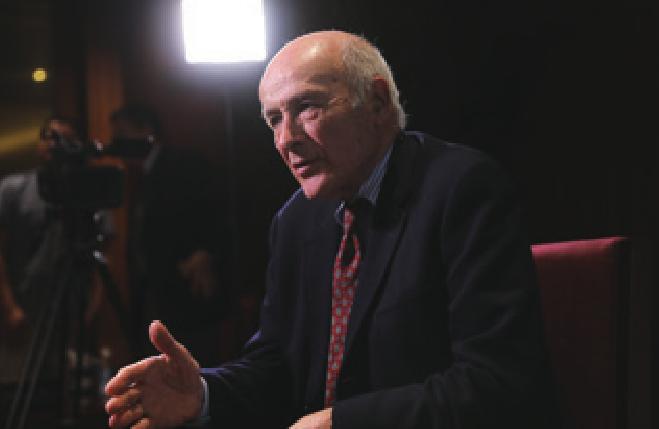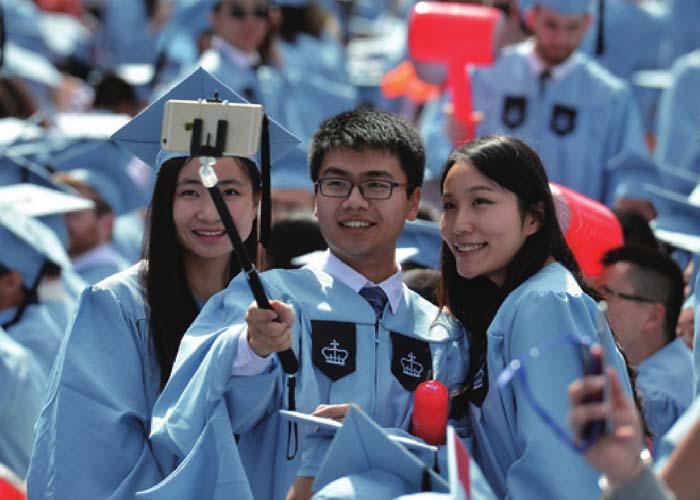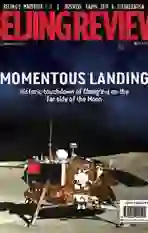Cooperative Rivalry
2019-02-14
The trade conflict launched by the Donald Trump administration against China in 2018 has pushed China-U.S. relations into a corner. However, U.S. political scientist and professor at Harvard University Joseph S. Nye, believes cooperation is far more important for the two countries. In a recent exclusive interview with Wang Xiaohui, Editor-in-Chief of China.org.cn, Nye shared his views on the current relationship between the worlds top two economies. An edited excerpt of the interview follows:
Wang Xiaohui: What is your view on the current state of U.S.-China relations?
Joseph Nye: Well, were going through a difficult time in U.S.-China relations. People focus a lot on the trade war and the question of whether we will fi nd some agreement on these trade issues. But its actually deeper than that. If Hillary Clinton had won (the U.S. presidency), there would still be difficulties. In other words, its not just Donald Trump who is the problem. Trump has made things worse, but theres a feeling among both Republicans and Democrats in Washington that China has not played fair, that there hasnt been real reciprocity. So that was there before him. Trump essentially is like a man who came along, saw a burning fi re, and poured gaso- line on it. So its fl aring up now, but the fi re would have been there anyway.
Some people say that China and the U.S. are locked in a trade war, a cold war, and some people even say the two countries are moving toward a real war. Do you think the two countries have the courage and the wisdom to get out of this?
I dont think China and the U.S. are destined for war. I dont think were even destined for a cold war. If you think back on the Cold War between the U.S. and the Soviet Union, you have to realize that there was almost no trade or social relations between the two. With China, we obviously have massive trade. And we have 370,000 Chinese students in the U.S., and millions of tourists going in both directions. This is not like the Cold War. And we should not use the language of cold war. I call it a cooperative rivalry because I want people to realize that even when there is rivalry, there can be cooperation. It is essential that we manage the U.S.-China relationship to have the cooperation part.
With climate change, fi nancial stability or pandemics, for example, there is no way the U.S. can solve these problems without working with China. And there is no way China can solve these problems without working with the U.S. So as we continue to think about this, we have to say yes, there will be tension, but there also has to be cooperation.
What worries me is when people talk about strategic adversaries, theyre thinking only about the negative side, but I think we have to get people to also think about the positive side at the same time. Thats why I suggest using a name like strategic cooperation or cooperative rivalry as a way to make sure that we focus on both aspects of the relationship.
Given President Trumps “America First”policy and the U.S. withdrawal from international agreements, what is your assessment of U.S. soft power over the last two years?
I think President Trump is defi nitely weakening U.S. soft power and you can see this in public opinion polls. When you have a slogan like “America First,” it makes everyone else feel like they come in second. It may be a good slogan for U.S. domestic opinion, but its a very bad slogan for international opinion, and so I think you could say that Trump has weakened U.S. soft power. Theres a London consultancy firm named Portland Communications that indexes what it calls the Soft Power 30, and the U.S. ranked fi rst among the top 30 countries a couple of years ago. Since Trumps election, it has fallen to third or fourth place.
What do you think of President Xi Jinpings concept of building a community of a shared future for humanity?
Well, I think that is a very good concept because if you just take again the issue of climate change, President Trump made a big mistake withdrawing the U.S. from the Paris Agreement, but climate change doesnt obey the laws of politics against the law of physics. And over time, climate change is going to damage both China and the U.S., and its essential that we fi nd ways to cooperate with each other and with other countries. I think President Xis slogan is a way of illustrating that type of cooperation. Its something which is going to be essential for all mankind. I sometimes say that we have to learn, not about power over others, but about power with others.
